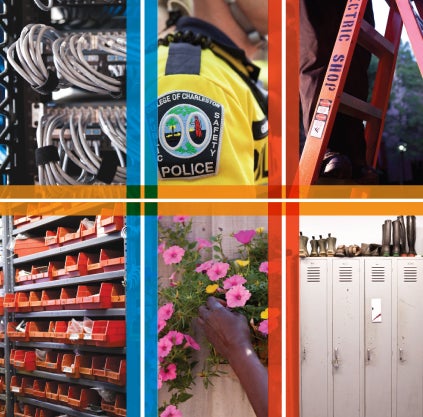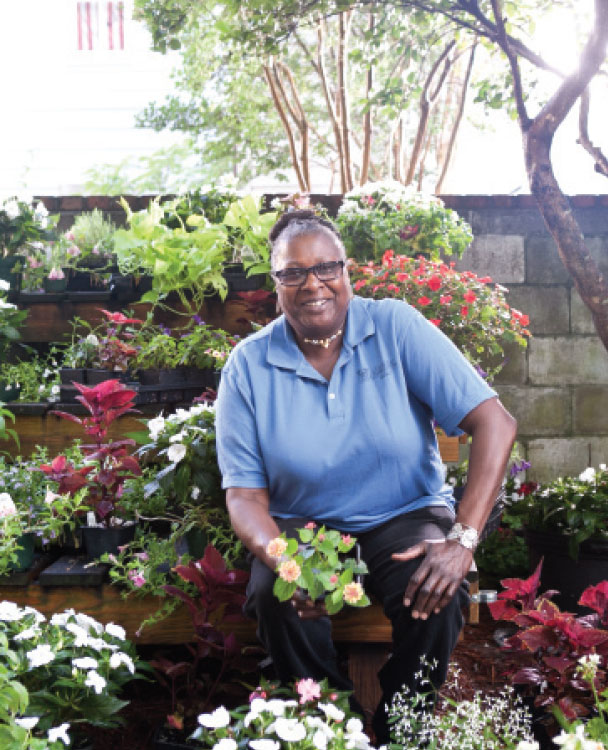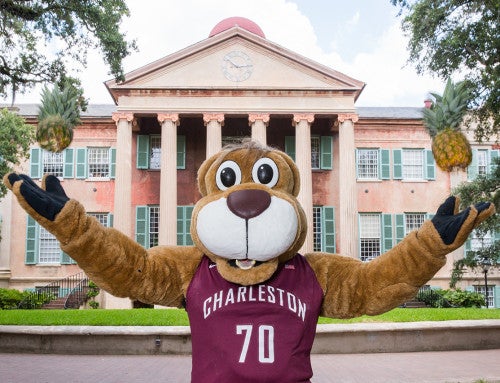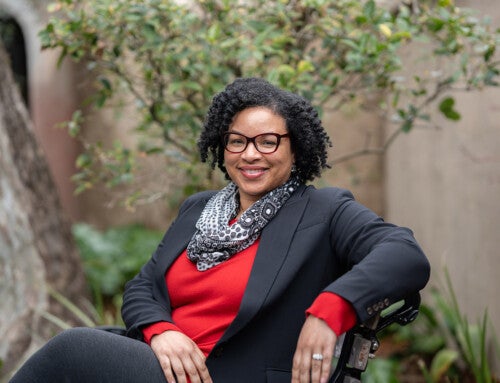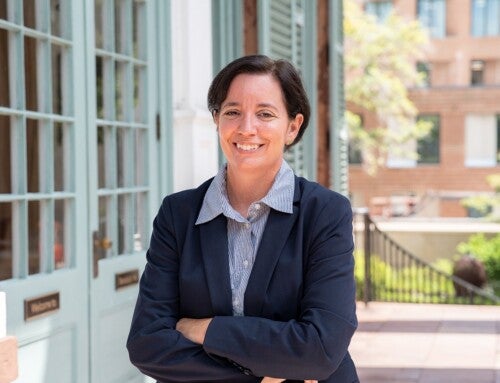At the College, we like to speak in metaphors. In true academic fashion, that type of language, that type of thinking, applies gravitas with just the right poetic flourishes. And so, we often frame our faculty and students – their collective curiosity and passion for inquiry – as the very heart and soul of campus. Which they are.
But, just as the human body is not simply a two-organ system of heart and brain, the body collegiate is also more than that. There’s another aspect of campus that is often overlooked. Although it may not be mentioned in our recruitment materials or celebrated in Cistern Yard ceremonies, there are legions of people working dutifully and creatively behind the scenes to support our academic mission. They are the nerve system, the muscle fibers, the very skeleton upon which the heart and mind are able to operate.
In these four portraits, we meet some of the men and women who work, day in and day out, to make this campus safe, operational and beautiful. Like their counterparts in the faculty, these staff members bring enthusiasm and expertise to their jobs, and through their everyday contributions, they showcase how the entire body works together to make the College of Charleston an exceptional place of learning.
The Networker
For most of us, it’s as simple as turning on our computers. Jim Bennett ’00, however, knows just how complicated an Internet connection really is. As the College’s network manager, he is always behind the scenes, keeping things simple for the rest of us.
Every morning – before the tangle of the day, the endless untangling of the day’s tasks – Jim Bennett ’00 checks in with his people, connecting with them individually, listening to their concerns and offering his support.
Do you have what you need to do your job?
His voice is calm, deliberate – the kind of voice that can only belong to someone patient, someone considerate.
For him, this is something of a morning vigil. He is mindful of that fundamental need for connection. He takes the time to understand, to be honest and fair – to be a conduit for encouragement and communication. We’re all connected, he assures the seven people on his team in the Division of Information Technology.
As the College’s network manager, nobody knows better than Bennett how essential it is to connect – to stay connected.
“The network is what runs the campus – every function is riding on that connection,” he says. “Without it, nothing can work.”
You start thinking about a thing as elusive as a network, and your mind can easily be boggled: all that data zipping across campus in the form of ones and zeroes somehow ending on your monitor in the form of a class assignment or a cat meme. How?
Don’t worry about it. Leave all that to Bennett and his colleagues. They manage the network from the 700 switches and 43 routers housed in the 187 equipment rooms across campus and in six off-site locations. Let them deal with all that. All you have to know is, it works. (This is where a little faith helps.)
“There’s a lot you don’t see when you’re walking across campus,” says Bennett, explaining that all the buildings are connected by underground fiber optic cables. “These connections are what make this place run.”
Boiled down, it is Bennett’s job to make sure the network is working. And safe. Here’s how he explains his job to his 7-year-old daughter (who, let’s face it, is probably just as capable of fathoming this mysterious network as the rest of us): “You know how the Internet comes out of your iPad and my computer upstairs? I help make that happen for the whole College.
“Not a great description,” he concedes, “but, she’s 7.”
When Bennett first came to the College, it was to study elementary education. Both Fran Welch, dean of the School of Education, Health, and Human Performance, and Genevieve Hay ’82 (M.Ed. ’85), associate professor of teacher education, took an interest in him and tried to convince him to pursue a teaching career. But by the time he graduated in December 2000, he already had a job with the College’s IT department waiting for him.
Most elementary education majors don’t become network PC engineers – especially not straight out of school. Bennett, however, had been a student worker for IT since 1998, when he started working the front desk, delivering papers that the different departments printed out on IT’s line printers. Kind of like the network cables do now, Bennett ran all over campus, delivering printed data to wherever it needed to go.
When, in September 2001, Bennett was made one of the College’s two network engineers, there were only 3 megabits/second for Internet, and the network had only 60 switches.
Things have changed. Things have grown. And Bennett has been part of it all – playing a key role in designing and building today’s ever-evolving network.
“It never really ends,” he says.
As the College acquires new buildings, for example, Bennett and his team expand the network architecture, taking on more switches and increasing connections to, say, Harbor Walk and the new North Campus.
But extending the network is the least of this team’s worries: It can plan for those projects. It’s the constant repairs that challenge them.
“You come to expect the unexpected,” says Bennett. “It doesn’t matter how well you plan, you can count on something breaking.”
Even at night. Even on weekends. Even on holidays. Two winter breaks ago, for example, there was a major power outage in one of the circuits, causing repercussions all over campus. Bennett spent most of his break on campus, sometimes working 15-hour days. His wife won’t let him forget it.
Although he’s on call 24/7, it’s not just emergencies that have Bennett on campus when everyone else is home. The majority of the team’s work is done when students aren’t around, with a good chunk of it scheduled between December commencement and Christmas: “While everybody else gets time off, that’s when we’re getting it all done behind the scenes.”
Behind the scenes is where Bennett likes to be – he’s a quiet force, quick to deflect attention, even quicker to praise his team.
“The amount of equipment is a lot for such a small team, but they make it fun and easy,” he says, noting that he always tries to match his team members’ varied skill sets to the task at hand.
“I think taking the time to learn people is important. When you know people, you know how they get their work done and what they need from you in order to do their best work,” Bennett says. “I believe we do the best when we understand each other and how we can help each other.”
At the end of the day, this is what keeps us all going – this sense that we’re working together for a greater purpose, a greater connection.
Thus, Bennett’s workday ends the same way it begins – with visits to each of his people, checking in, offering support: Do you have everything you need to do your job?
“If they do,” he says with a smile, “I consider that a success.”
– Alicia Lutz ’98
The Cultivator
Officially, Marlene Williams’ job is a crew leader of the College’s campus grounds department. Really, though, she’s an artist.
When you walk through campus, you can’t miss Marlene Williams’ masterpieces. There are all the hanging baskets suspended above piazzas, popping with petunias. There are the black pots sitting along Cougar Mall, dripping with ivy and assorted colors of calibrachoa, or Million Bells. There are the two large planters standing behind Addlestone Library, each holding a dwarf palmetto and teeming with pansies, snapdragons and dianthus. These are just a few of the more than 150 flower containers that Williams plants and maintains around the College.
One day this spring, the affable Williams stood beneath the shade of an oak tree off Coming Street, preparing to plant a container destined for a shady area of the President’s Garden.
“They call it potting soil, but it’s dirt to me,” says Williams as she fills the container bottom.
She next adds fertilizer.
“It’s like mixing up a nice little cake,” says Williams, stirring the soil with her hands.
Then comes the fun part: picking the plants. Williams makes three depressions in the soil before sinking three eye-catching coleus plants into the container. One coleus is handsomely blood- and copper-colored. The other two are maroon and green.
“It grows big, it spreads,” she says of the plant. “I just like it.”
Three waxy, red-flowered begonias come next, followed by yellow torenia, which blooms well in shade.
“I like a burst of colors. I like light, not darkness,” she notes.
Williams is careful not to crowd the pot or pack the soil, leaving room for young plants to grow. After planting a few more flowers, she adds the final touch before watering: non-toxic slug poison.
“They got to eat,” she concedes. “I just don’t want them to eat my work.”
Eliminating a slug is about as mean as the mild-mannered Williams gets. She’s all about harmony and understanding.
“My main objective in life is to love people, respect people and have them love me,” says Williams. “I try to keep a clean heart and don’t wish harm on anyone.”
Williams was born on James Island and moved to New York City with her mother when she was 6 years old. About four years later, after returning to South Carolina, her mother passed away from a brain tumor. Williams then moved back and forth between older siblings’ households in South Carolina and New York before graduating from James Island High School, where she was a star on the basketball and track and field teams.
She moved away to Charlotte for college, desiring independence, then moved back home when she found out independence wasn’t all it was cracked up to be. She finished her education at Trident Technical College and then had careers in ship welding and port operations. For 15 years, she ran her own ice cream truck business.
Meanwhile, she’s raised three children: two boys and a girl. Williams’ older kids live in South Carolina, but her baby boy, Husain, is up in New York, singing under the performance name Mello Deas.
“I ain’t braggin’, but he’s good,” says Williams. “I just wish and pray every day that someone will listen and see how good he is.”
One day, back around 1997, Williams applied to the College’s grounds department, despite having no landscaping experience. She was hired, but was quickly warned that she’d receive no pity on account of her gender.
“You come here on a man’s job, you’re going to do a man’s job,” one co-worker told her when she started.
Indeed, Williams was sent to cut grass and weed-whack, no matter the often hot and humid Charleston climate. These days she still works hard, patrolling campus with the rest of the grounds crew during their 7 a.m. “police call,” in which they pick up trash and cigarette butts. After that, the crew meets and divvies up assignments for the day. In May, the grounds crew works particularly hard to make the campus beautiful for two big events: A Charleston Affair and the spring commencement ceremonies, which are held on subsequent weekends.
Walking through campus, Williams tidies up pots she planted months earlier. Plants inevitably get leggy or start to wither when the weather changes, requiring their removal. Williams pulls them from the pots unceremoniously.
On a campus as heavily landscaped as the College, there’s always more to do. Things look good, but they could always look better, at least according to the exacting eyes of the grounds crew. When work is over each day, the 60-year-old Williams is tired.
“It’s a lot of lifting and bending. You’re putting a lot of stress on your body, really,” she says. “But you just keep on plucking because you know you gotta do it. That’s life.”
Williams is not a complainer. She’s had ups and downs in life, but she does not whine, does not make excuses. When other people come to her to talk in confidence, she listens and sympathizes, but also reminds them that obstacles are things to be overcome.
“Lift your head up,” she says. “Somebody has it worse than you.”
Looking ahead, Williams hopes to build her own home on family land on James Island.
“That would be a big goal for me. That would be a blessing,” she says. “I think I’m going to get it one day. I don’t know how or when, but it will happen. It will definitely happen.”
In the meantime, Williams communes five days a week with flowers and shrubs, adding bursts of color to a campus that everyone can enjoy and admire.
“I don’t know if they feel my spirit or not,” she says of her leafy companions, “but I feel theirs.”
– Jason Ryan
The Guiding Light
The smile and can-do spirit of Markus Williams of the Physical Plant are as bright as the lights he keeps burning around campus.
Markus Williams backs his green Honda CRV out of his driveway in Hanahan a little after 6 a.m. most weekdays. When it’s your job to make sure the lights are on, the day starts early.
As an electrician, Williams deals with a lot more than lights. If it relies on the campus power plant and if it’s ever needed repair, there’s a good chance Williams has worked on it. He joined the Physical Plant department in 2008. Before that, he plied his trade in construction. When the recession hit, he went looking for steadier work.
His clipboard holds a stack of work orders, each identifying a different electrical problem around campus. These printouts are a map of Williams’ day. Each promises a new challenge. Some – say, an expired light bulb – he’ll fix in a jiffy. Others – perhaps an issue somewhere in the underground maze of wires snaking around campus – are more complicated and may require several days of attention. He’s not seen a day yet where there were no work orders.
Students always take priority. So Williams and his colleagues work around class schedules. He calls the registrar’s office to find out if a room is in use. Still, after unlocking a door, he opens it a crack and peeks inside, just to be sure. All clear.
Williams likes working around students. They remind him of his own children. Tonight is his daughter’s high school senior prom. That alone makes this papa proud – that his daughter is growing up and will soon be headed to college. But there’s more good news: Williams’ son, a freshman at Louisburg College in North Carolina, just finished classes and arrived home last night. He is taking his little sister to her prom. That’s the kind of thing that’ll bring a tear to a father’s eye.
Williams and his wife also have a 6-year-old son. When Williams attends night classes for electrical engineering, the little guy is often asleep by the time his dad pulls into the driveway. The routine starts over again the next day.
When he gets his work orders first thing in the morning, Williams prioritizes the jobs based on when he can gain entry. Some buildings are easier to access than others. There’s rarely an empty classroom in Maybank Hall during the day.
“If I see Maybank, I go there first,” he says.
There are no work orders for Maybank today. A public safety officer doing her nightly rounds has noted, among other routine deficiencies, a burned-out streetlight along Physicians Promenade. Williams carefully climbs a ladder, pops the top on the street lamp, removes the bulb and checks the circuit. Both check out fine, so he has a pretty good idea where the problem is. There’s a switch on the light post that overrides the sensor that turns the light on at night and off in the morning. Sure enough, it’s been flipped. Problem solved.
The electricians often work in teams. Today, Williams is paired with Herbert Frasier Jr. Earlier this morning, both attended a breakfast reception honoring Frasier’s father, Herbert Frasier Sr., who is retiring from the Physical Plant after 42 years on the job.
That’s a long time to work at the same place, Williams says. But he can understand why some people would stick around that long, if they liked their work.
“I love this job because you meet a lot of people,” he says. “There are always new faces – always something different.”
If there’s an electrical problem on campus in the middle of the night, on a weekend or holiday, the on-call electrician will get a ring at home. It’s happened to Williams a couple of times. Early one winter morning, a public safety officer smelled smoke in the Robert Scott Small Building. Williams knew his number was up when he saw the incoming number on his caller ID. It turned out that the heat had recently been cranked on, and it burned off some dust as it warmed the vents. Well, at least traffic was light at 1 a.m.
Williams wears a maroon long-sleeved shirt and a black baseball cap that says NY. Williams is not from New York. He grew up in Berkeley County’s Huger community. But he’s visited the Big Apple and enjoyed it, so he wears the hat most days.
He walks down a hallway on the second floor of the Lightsey Center, his steel-toed boots squeaking on the polished floor and a ring of keys jangling from his belt loop. A screwdriver and pliers poke out the back right pocket of his black work pants.
A row of electric outlets in a lab has no power, the work order says. There are dozens of outlets around the room, and the work order doesn’t specify which ones lack juice. Starting in a corner of the room, Williams patiently checks each outlet with a voltage meter. A red light and a beep on the pen-like device signal if the outlet is good.
After identifying the faulty outlets, he walks down the hallway to an electrical panel and resets the breaker. Then back to the lab. A computer monitor plugged into one of the previously dead outlets flickers to life. Another job complete.
Williams heads over to the School of Education, Health, and Human Performance Building on Wentworth Street. A row of safety lights in a stairwell is not working. If there were a power outage, the battery-powered safety lights would cut on to help ensure safe passage out of the building. The way Williams sees it, these are not just some lights in a back stairwell in a remote corner of campus. Those beacons could aid in an emergency. He takes that seriously.
His daughter is headed off to college in the fall. He will worry about her safety, as fathers do. He hopes her university has a
good electrician.
– Ron Menchaca ’98
The Good Cop
While most of us may hop on a bicycle for exercise or recreational use, for Officer Richard Gillard ’06 (M.A.) of Public Safety, riding a bike is an essential part of keeping the College safe and sound.
The world looks a little different at 6:45 a.m. For most of us, we’re just revving up for the day, maybe hitting “sleep” for the last time on our alarm clocks or trying to get the kids ready for school or perhaps starting our own half-awake, mostly-asleep commuter’s march to work.
At 6:45 a.m. on campus, Officer Richard Gillard ’06 (M.A.) is seated in the Department of Public Safety’s command room on St. Philip Street listening to his daily briefing. It’s a quick 15-minute meeting. An opportunity to learn of any issues from the previous night shift as well as a rundown of the day’s 12-hour patrol assignments. Fortunately, it’s business as usual.
Gillard glances up at the wall-mounted map, which divides the campus into four sections: Areas 10, 20, 30 and 40. Within those areas, blocks of campus are color coded by shades of blue, green, yellow, orange and red. Today, he will crisscross the persimmon orange portion of the map: Area 30, covering Bull Street south to Beaufain Street.
At 7 a.m., Gillard pulls out his bike, makes a few adjustments to his gear and then heads to his first mandatory stop: Starbucks. There’s not much of a crowd yet – no students or faculty members lining up for their frappuccinos or espressos. He orders his usual, a tall blonde, because it delivers a 330-milligram caffeine jolt. It’s like an adrenaline shot to the heart. A few sips down, the caffeine dispersing the last remnants of the mind’s morning fuzziness, he heads off to his beat.
This is his favorite time of day. Everything is quiet. Well, mostly quiet. There are the sounds of distant, early-morning delivery trucks, brakes squealing and the beep-beep-beeping as the heavy vehicles ramble in reverse. There’s also a trilling birdsong, a soft, melodic accompaniment that will later be drowned out in the action of the day.
But what Gillard loves most are the voices of his colleagues: the scattered laughter and animated conversations of the residence life team, grounds crew and Physical Plant employees. In this stillness, before the campus is fully awake, it’s a chance to catch up and hear what’s going on in different areas of the College. It’s something of a secret world, at this time of day, that only a privileged few get to experience.
It also feels different. There’s a crispness in the air that will soon melt away with the high temperatures and high humidity. But right now, it’s cool, and the campus is awash in warm colors from the rising sun, acting as a spotlight on Calhoun Street.
Gillard, his bright yellow uniform reflecting in the morning light, pedals down this street that bisects not only the campus, but the entire Charleston peninsula. He can’t help but think how this street has also cut across his own life: “I guess I’ve never left Calhoun. I was born in Roper Hospital, which is still down the street, then later went to Bishop England – in the spot where the Addlestone Library is now – took my graduate history classes right there in Maybank Hall, and now I’m here. Funny how things work out.”
As a student of history, Gillard appreciates how things unfold, how seemingly random events build upon random events – only in retrospect does a pattern emerge.
“Everything in my life is by accident,” he laughs.
Perhaps. Or maybe the pattern in his life is not fully evident quite yet. Gillard has taken a circuitous route to this job, with stops as a boarding agent for container ships, a logistics coordinator for the port and a six-year stint with the U.S. National Guard. With a desire to get into law enforcement, Gillard hadn’t considered a career in campus public safety until one day, leaving his daughter’s ballet recital on King Street, he happened to see two officers on patrol. It was a light bulb moment for him.
And seven years later, the light is still burning bright.
However, the life of a bicycle officer is not easy. “It’s cardio all day,” Gillard points out. “As you can imagine, there’s a lot of riding. I easily pedal 25 to 30 miles a day. Every day is like a marathon.”
That’s why he took the odometer off his bike soon after he started: Gillard didn’t want to know how many miles he logged each day. His aching lower back, his stiffening knees and his hands – tense from holding onto the vibrating handlebars – were the only reminders he needed at shift’s end. And a mileage number will only weigh him down – like the 20 pounds he carries on his uniform: the vest, the belt, the notebook. Not knowing his mileage is a little mental trick he plays to keep himself as fresh in the morning as he needs to be closer to 7:00 at night.
Because each day is vastly different. Maybe it’s trapping a squirrel that’s wreaking havoc in a professor’s office or getting somebody out of a stuck elevator or jumpstarting a stalled car or responding first on a scene when someone is hurt.
But even within that variety, there is a routine. At each class change, officers find a spot in their area that has the heaviest foot traffic. They understand that it’s important to be visible. Because for public safety officers, service greatly outweighs enforcement – the citations, the tickets.
And that’s evident right now, as a stream of students, faculty and staff files by Gillard, perched on his bike. While some are lost in their workdays or concentrating on their next classes, many others smile and call out to “Officer Bubba,” as he is known to most on campus. Seeing him there brings them a peace of mind that there is someone nearby who can help, if needed.
“That’s what makes this job so great,” says Gillard, leaning forward on his bike. “We’re here – rain, sleet or shine – always ready to lend a hand.”
– Mark Berry

